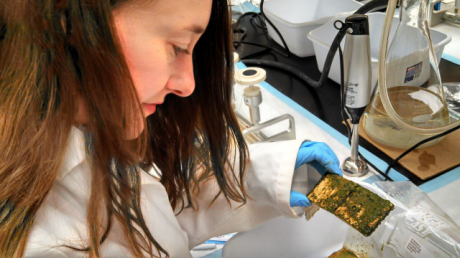 A researcher scrapes tiles to gather samples for the atrazine study.Photo Courtesy of Ryan KingWACO, Texas (Sept. 3, 2015) — A recent study by a multi-disciplinary team of Baylor University researchers found that a popular herbicide does not appear to have a long-term, measurable impact on aquatic plant life.
A researcher scrapes tiles to gather samples for the atrazine study.Photo Courtesy of Ryan KingWACO, Texas (Sept. 3, 2015) — A recent study by a multi-disciplinary team of Baylor University researchers found that a popular herbicide does not appear to have a long-term, measurable impact on aquatic plant life.
The study—“Effects of pulsed atrazine exposure on autotropic community structure, biomass, and production in field-based stream mesocosms”—is published in Environmental Toxicology and Chemistry.
The study looked at atrazine, a common herbicide used to control weeds in corn and sorghum crops in large-scale farming operations, at the “level of concern” as identified by United States Environmental Protection Agency.
The study’s lead investigator on the study, Ryan S. King, PhD, professor of biology in Baylor’s College of Arts & Sciences, said this research is the first to address atrazine levels as they would “naturally occur in agricultural areas during rainfall runoff events.”
“Previous studies at this scale have almost exclusively performed static exposures; that is, added atrazine to the water at a constant rate such that the concentration stays the same over time. This does not occur in nature; hence our study using pulsed exposures is far more appropriate for assessing the effects of atrazine, or any pesticide for that matter, on aquatic life,” King said.
Using the Baylor Experimental Aquatic Research (BEAR) artificial stream facility, a 30,000-square-foot outdoor facility with 12 artificial streams and 24 wetland and pond habitats, Baylor researchers dosed three different streams with four pulses of atrazine to achieve average concentrations of 10, 20 and 30 ug/L over a 60-day period.
Atrazine was pulsed through (1) fast-moving water, (2) slower, shallow water and (3) deep, slow-moving water to mimic naturally-occurring scenarios. After the dosing period ended, researchers allowed the streams to remain untreated for 27 days and monitored the aquatic plant life during that time.
During the treatment phase, King said the researchers found that atrazine had only temporary effects on more than a dozen different biological response variables. However, the vast majority of those variables had recovered after the dosing ceased.
“Only two response variables were affected by atrazine at the end of the study following a recovery period, and these effects were slight and unlikely to be ecologically significant,” King said.
As part of the study, researchers focused on algae and other plant life to see how they were affected by the various atrazine levels.
“We determined that atrazine exposures bracketing the current level of concern are highly unlikely to cause adverse outcomes for primary producers, those organisms that are on the bottom of the food chain,” said Kevin Chambliss, PhD, professor of chemistry in Baylor’s College of Arts & Sciences, who verified the atrazine levels as part of the study.
The study, which addresses a gap in the scientific literature, will assist policymakers with making an informed decision on setting the levels of concern for atrazine in water systems, King said.
“This is the first stream study to carefully examine aquatic stress caused by realistic herbicide runoff scenarios. It further provides and experimental model for how to examine pesticide impacts on streams in the future,” said Bryan W. Brooks, PhD, professor of environmental science and biomedical studies in Baylor’s College of Arts & Sciences.













